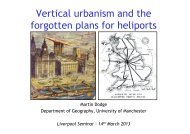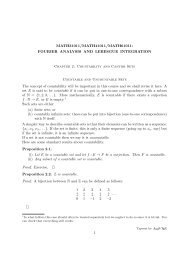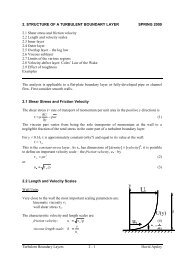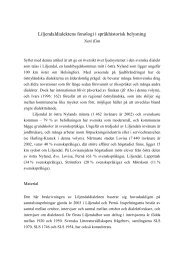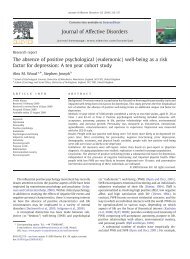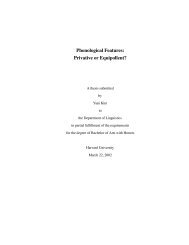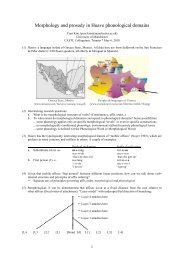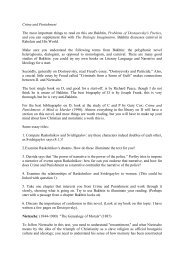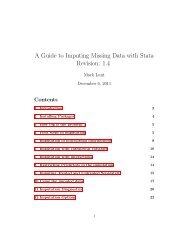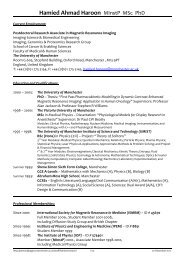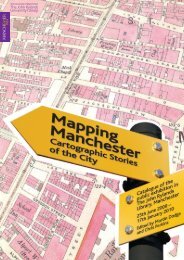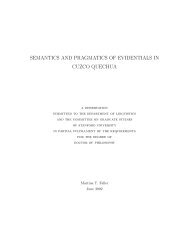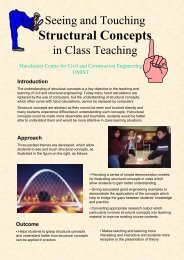LGBT Sport Observatory Issue 4: Spring
LGBT Sport Observatory Issue 4: Spring
LGBT Sport Observatory Issue 4: Spring
Create successful ePaper yourself
Turn your PDF publications into a flip-book with our unique Google optimized e-Paper software.
<strong>LGBT</strong> <strong>Sport</strong> <strong>Observatory</strong><br />
<strong>Issue</strong> 4: <strong>Spring</strong> – Summer 2012<br />
Welcome to the 4 th issue of the <strong>LGBT</strong> <strong>Sport</strong>s<br />
<strong>Observatory</strong>. In this edition, and in line with our remit<br />
of supporting and promoting the complex social<br />
reality of sport and sport participation, we step into<br />
the academic world to look at the potential of two<br />
theoretical frameworks for comprehending sports<br />
phenomena. In particular we review Queer Theory<br />
and the perspective of socio-psychological Resilience<br />
as lenses to interpret sport participation and some of<br />
its effects.<br />
Theoretical frameworks are interpretative proposals -<br />
the practical utility of which is to deepen our<br />
understanding of phenomena. By default they offer a<br />
set of propositions on how ‘things’ relate to each<br />
other or how things occur, while raising to the<br />
forefront phenomena or relationships that may<br />
appear otherwise not apparent, unrelated, or simply<br />
disregarded if observed from other perspectives.<br />
Similarly to the truth behind the saying ‘hammer only<br />
sees nails’, the excessively bio-scientific or positivist<br />
lenses of the sports industry including National<br />
Governing Bodies and the media tend to filter out or<br />
exclude many of the rich socio-psychological<br />
1<br />
dimensions inherent to sport. We believe that<br />
awareness of the dominance of either bio-scientist,<br />
managerial or masculinity lenses, and also knowledge<br />
of alternative theoretical frameworks have the<br />
potential to raise critical awareness of current<br />
predominant interpretations of sport.<br />
As in previous issues, in this issue we promote the<br />
study of the complex social nature of sports by<br />
publicising calls for participants on various research<br />
projects relating to <strong>LGBT</strong> sport and participation.<br />
We then cast out eyes onto the <strong>LGBT</strong> European and<br />
global context and we look at the latest developments<br />
as regards the split of the international <strong>LGBT</strong> sport<br />
‘community’ and the positioning of the European<br />
<strong>LGBT</strong> sport clubs vis-à-vis the competing sides. There<br />
are some mixed signs that recent talks towards one<br />
global quadrennial event in 2018 could end the<br />
dispute between the Federation of Gay Games (FGG)<br />
and Gay and Lesbian International <strong>Sport</strong>s Association<br />
(GLISA).<br />
Finally, among other UK news, we look at the ‘state of<br />
play’ in <strong>LGBT</strong> sports in Europe in the context of the<br />
UEFA 2012 European Football Championships and in<br />
the run up to the London 2012 Olympic Games. The
initiative of setting a Pride House as an embassy of<br />
and for <strong>LGBT</strong> sport is a new and welcome<br />
development in the effort to raise issues of<br />
representation and participation of <strong>LGBT</strong> community<br />
in sport.<br />
Understanding <strong>LGBT</strong><br />
<strong>Sport</strong><br />
In this section we grab hold of two theoretical<br />
(interpretive) frameworks and apply them to sport.<br />
The first one, Resilience, is a term largely associated<br />
with medical and psychological sciences. A study of<br />
the etymology of the word and its use by different<br />
disciplines and approaches reveals the powerful<br />
reality of the term and also its multiple manifestations<br />
across human lives. The second framework, Queer<br />
Theory departs from the proposition that identities<br />
are not fixed. Queer Theory is a powerful tool that<br />
allows us to deconstruct and challenge social<br />
categories such as gender or sexuality.<br />
<strong>Sport</strong> as a potential context and source<br />
of LGB Resilience<br />
Dr. Gloria Gil, University of La Laguna, Tenerife.<br />
There is a growing interest in understanding the<br />
processes by which LGBs come to terms with sexual<br />
orientation. Resilience, as a social psychology concept,<br />
can appropriately be used as a theoretical framework<br />
to interpret these processes of identity development<br />
and to unveil the favourable factors. Under this frame<br />
of reference, sports -as physical activity and social<br />
context - can contribute to enhance resilience.<br />
2<br />
Resilience, as a term has, over its relatively long<br />
history, mutated and changed its meaning, as well as<br />
being applied to different fields. In common speech,<br />
resilience is understood as denoting the capacity in an<br />
individual to ‘bounce back’ from the negative effects<br />
of adversity. Thus while endurance entails a capacity<br />
of self-sustenance in an adverse status quo, resilience<br />
conveys rising above adversity and implies progress<br />
and growth, a leap forward in human development.<br />
More recent understandings of this subject envision<br />
resilience as a process that surpasses the individual<br />
scope, as context and specific socio-cultural factors<br />
play a fundamental role in its development.<br />
Processes of resilience involve first of all the presence<br />
of adversity, either pervasive or confined to definite<br />
difficulties. Generally, in the sports context, resilience<br />
has been used to interpret the overcoming of sport<br />
challenges such as the recuperation from setbacks,<br />
injuries or defeats.<br />
Applied to the <strong>LGBT</strong> identity development, adversity –<br />
in the form of homophobia - can be either ubiquitous<br />
or restricted to specific areas of or periods in life.<br />
Sometimes it can be experienced in the school<br />
context, in the family, in workplace, religious circles,<br />
or healthcare environments, to name a few. The<br />
effects of this adversity depend on the degree it is<br />
suffered -from name calling to deliberate bullying, or<br />
from subtle unequal treatment to outright<br />
homophobic violence.<br />
However, cognitive, psychological, social or cultural<br />
factors around the individual can help to promote<br />
resilience processes. Personality traits -such as<br />
creativity, sense of humour, independence, capacity<br />
to interact- among other factors as personal ideology,<br />
interaction with community or indeed external
support, have been identified as resilience factors in<br />
all kind of processes, and hence they promote positive<br />
development in <strong>LGBT</strong> people.<br />
<strong>Sport</strong>, as an activity that offers opportunities to gain<br />
internal strength, self-esteem, social acceptance and<br />
favours interaction with <strong>LGBT</strong> peers, can<br />
proportionate a rich context and a direct source of<br />
resilience. Conversely, sports –some more than<br />
others- can deeply embed homophobic values and<br />
dominant cultural constructs such as<br />
masculinity/femininity, and thus represent a buttress<br />
of adversity, difficult to overcome. In such<br />
circumstances, the non-resilience scenario can<br />
emerge: responses to adversity such as indifference,<br />
submission, hiding or avoidance are examples of<br />
strategies that withhold resilience. Especially those<br />
that imply hiding sexual orientation have been found<br />
to reduce the opportunities of social support, increase<br />
psychological stress, undermine self-esteem and self-<br />
value as well as consuming a high amount of<br />
emotional energy.<br />
<strong>Sport</strong> practice can be an arena for experiencing<br />
successful processes of resilience (e.g. individuals in<br />
teams that go through a bad phase but manage to<br />
overcome poor results, or experiences of strength in<br />
teamwork). Also, practising sports can give rise to a<br />
number of resilience factors related to the promotion<br />
of a healthy life style and care for one’s body – in the<br />
case of some LGTBs they can serve to counteract<br />
internalised homophobia manifested though<br />
behaviours that oppose one’s own health. Similarly,<br />
this context can offer opportunities for<br />
interconnection and to experience positive values<br />
(personal best effort, fair play) and for transfer of<br />
learning onto LGB identity development processes.<br />
Finally, from a holistic point of view, sport also can be<br />
3<br />
a source of resilient energy, by being a rich<br />
environment for relationships (with coach, team<br />
mates, and group experiences), learning (skill,<br />
technique, strategy) and creative potential (goal<br />
setting, rewards such as Personal Bests, or use of<br />
personal creativity and effort).<br />
As an interpretative framework, the notion of<br />
resilience unveils and informs the complexity and the<br />
diversity of processes of identity development in<br />
<strong>LGBT</strong>s and the wide variety of factors that can (or not)<br />
promote resilience. Under this frame of reference<br />
sport is conceived as a socio-psychological<br />
phenomenon that facilitates the development of<br />
factors that contribute to positive identity<br />
development in <strong>LGBT</strong> people. For this reason, hetero-<br />
normativity and exclusion due to deviation from<br />
cultural constructs -as sources of adversity for <strong>LGBT</strong>-<br />
should be eliminated from this context to allow that<br />
sports fully become an oasis for resilience and identity<br />
development.<br />
What can the study of queer theory contribute<br />
to the analysis of sports and <strong>LGBT</strong> sports?<br />
Jonah Bury, University of Bristol<br />
The term ‘queer’, deriving from political activism<br />
around HIV/Aids in the 1980s, initially found its way<br />
into academic scholarship in the early 1990s in the<br />
form of what has become widely known as ‘queer<br />
studies’; one of queer studies’ overarching goals has<br />
since been to expose the seeming naturalness and<br />
fixity of (sexual) identity categories and expose the<br />
way they result in forms of exclusion. As I will show in<br />
the following article, queer theory can be fruitfully<br />
applied to the study of mainstream sports and <strong>LGBT</strong><br />
sports. To do this, I will focus on Association Football;
firstly because my own academic research focuses on<br />
football, but also because football’s status as the<br />
national sport and the proliferation of so-called gay<br />
and gay-friendly football clubs make it a good<br />
example to study.<br />
Association Football has been and continues to be<br />
associated with (heterosexual) masculinity. This is<br />
perhaps best evident in the term women’s football,<br />
which reveals how women’s football is assumed to be<br />
somehow less ‘real’ and different from ‘proper’<br />
(men’s) football. Another example is the all too<br />
common assumption that all male footballers must be<br />
heterosexual, while all female footballers must be<br />
lesbians by virtue of playing a masculine sport. The<br />
primary contribution queer theory can make here is to<br />
unravel the heterosexuality-masculinity nexus of<br />
football and point to the different ways in which this<br />
connection is being maintained and reinforced. Queer<br />
theory can highlight how masculinity and<br />
heterosexuality are no fixed categories one possesses,<br />
but something which is constantly ‘performed’. Such<br />
‘performances’ can take many forms; they can appear<br />
in the form of explicit sexist or anti-gay language, but<br />
can also occur in more subtle ways, for instance<br />
through the invisibility of women in key positions in<br />
men’s football and a conspicuous silence on sexuality<br />
and difference. Through such mechanisms, an<br />
environment is created in which difference from the<br />
masculine-heterosexual norm (e.g. women or gay<br />
men playing football) is treated with suspicion and<br />
inferiorised.<br />
<strong>LGBT</strong> sport clubs have largely formed against such a<br />
background and provided a space where reigning<br />
norms around heterosexuality do not prevent them<br />
from partaking in sporting activities. They can thus<br />
often be seen as safe, inclusive and even empowering<br />
4<br />
places. However, from a queer perspective, the term<br />
<strong>LGBT</strong> can initially be seen to stand at odds with the<br />
constitutive premise of queer theory, which is to<br />
disrupt fixed identity categories and to expose how<br />
they become naturalized. Nonetheless, queer theory<br />
is far from incompatible with the study of <strong>LGBT</strong> sport;<br />
rather, it provides an analytical toolbox with which to<br />
explore how power and identity categories operate<br />
within <strong>LGBT</strong> sport itself.<br />
It is important to understand that power and<br />
discrimination do not simply vanish once <strong>LGBT</strong><br />
individuals find inclusive sporting space away from the<br />
world of heterosexual mainstream sports. In fact, they<br />
might generate new forms of exclusion and norms,<br />
which is an important insight from queer theory.<br />
Potential questions which are worth exploring for<br />
<strong>LGBT</strong> sports might look at how competitiveness is<br />
valued and understood within <strong>LGBT</strong> sports and who it<br />
benefits. Also, it could be interesting to examine to<br />
what degree <strong>LGBT</strong> sports really ‘queer’, that is disrupt<br />
and subvert, the sex-segregated dimension of<br />
mainstream sports? I believe that this question is<br />
particularly important because sex-segregation in<br />
football contributes to the idea that only men’s<br />
football warrants attention while women’s football is<br />
continually trivialized. A further question could<br />
examine the relative absence of ethnic and racial<br />
minorities within <strong>LGBT</strong> sport, which serves as a<br />
reminder that queer theory extends far beyond the<br />
power and divisiveness of sexuality.<br />
The above list is obviously far from exhaustive, but<br />
raises important questions which highlight that queer<br />
theory can be highly useful for scholars, policy-makers<br />
and athletes alike in detecting and subverting power<br />
and exclusionary mechanisms which occur in<br />
mainstream sports and <strong>LGBT</strong> sports alike.
Research corner<br />
Study on the experience of <strong>LGBT</strong>IQ and straight<br />
athletes in <strong>LGBT</strong>IQ clubs or teams<br />
A study that examines the experiences of lesbian, gay,<br />
bisexual, transgender, intersex and questioning<br />
(<strong>LGBT</strong>IQ) athletes, and straight athletes who play on<br />
<strong>LGBT</strong>IQ sports teams or clubs is being conducted at<br />
the University of North Caroline in the US. This study<br />
looks at how <strong>LGBT</strong> athletes, coaches, and officials<br />
visualize their involvement in sport.<br />
The study asks participants to complete the ‘Come<br />
Out to Play’ survey - which was initially developed by<br />
researchers in Australia. Participants are asked to take<br />
or find a photograph that expresses how they feel<br />
about their sporting experiences and upload it. The<br />
survey can be completed in approximately 30 minutes<br />
or less.<br />
The survey is available online at:<br />
http://tinyurl.com/ComeOutToPlay. For more<br />
information contact: reo0721@hotmail.com<br />
Study on sexuality in the football pitch<br />
A study at the University of Leicester is seeking for<br />
participants for a study on: how is gender produced<br />
through sport - with a focus on football, why is the<br />
football pitch the ultimate heterosexual space where<br />
homosexual identities are hidden, and the obstacles<br />
for male homosexual footballers to ‘come out’.<br />
For more information contact: ab539@leicester.ac.uk<br />
5<br />
Towards a<br />
quadrennial event?<br />
Back in April 2010, and coinciding with the European<br />
Gay and Lesbian <strong>Sport</strong>s Federation (EGLSF) Annual<br />
General Meeting at Manchester, a momentous step<br />
towards the awaited re-union of the international<br />
sports community was announced by the Co-<br />
Presidents of the Federation of Gay Games (FGG),<br />
Emy Ritt and Kurt Dahl and the Co-Presidents of Gay<br />
and Lesbian International <strong>Sport</strong>s Association (GLISA)<br />
Julia Applegate and Wessel Van Kampen. In what it<br />
felt like a significant turning point in the history of the<br />
split, FGG and GLISA presidents announced and<br />
outlined a proposal for future collaboration between<br />
the two organisations which included the proposal to<br />
organise a joint quadrennial <strong>Sport</strong>, Culture and<br />
Human Rights world event in 2018. Board<br />
representatives from both organizations did commit<br />
to work together to reach an agreement.<br />
The news travelled fast and in the immediately<br />
following days and weeks the <strong>LGBT</strong> community<br />
worldwide celebrated the announcement. A face to<br />
face meeting between the FGG and GLISA<br />
International was then scheduled for early May 2012<br />
in Montreal to discuss a mutual contract that would<br />
commit the two organizations to work together on<br />
joint world events in 2018 and beyond. Since the<br />
deadline for initiating the site selection process for<br />
the 2018 host was nearing, the objective of the May<br />
Montreal meeting was to strike full agreement<br />
between the FGG and GLISA.
Representatives of both organizations have worked<br />
hard over the last two years to create a Memorandum<br />
of Understanding agreement for a World Quadrennial<br />
Event. However, before the May Montreal meeting,<br />
FGG and GLISA announced that while an agreement<br />
on a number of issues had been reached, the<br />
negotiations had been difficult and the two sides had<br />
been unable to reach a full agreement.<br />
Distancing itself from recent statements by FGG and<br />
GLISA, EGLSF has argued that not every attempt has<br />
been made to create the one global event <strong>LGBT</strong><br />
athletes were hoping for. In a recent press release the<br />
EGLSF Board has called upon both organisations to try<br />
once more to reconcile the difference and sign an<br />
agreement for 2018. EGLSF also denounced that the<br />
split did not reflect the wishes of members and<br />
individual athletes, for which the games are intended.<br />
EGLSG has directly criticised how the differences and<br />
institutionalised beliefs of two organisations appeared<br />
to be more difficult than fulfilling the wish of <strong>LGBT</strong><br />
grassroots, clubs and athletes.<br />
News<br />
Legislation update<br />
The Equality and Human Rights Commission (EHRC)<br />
has announced that it is no longer able to proceed<br />
with plans for further statutory codes of practice on<br />
the Public Sector Equality Duty. The EHRC website<br />
states:<br />
“We were intending to produce further<br />
statutory codes of practice on the Public<br />
Sector Equality Duty (PSED), which came into<br />
6<br />
force on 5 April 2011. Unfortunately, we are<br />
no longer able to proceed with these plans.<br />
The Government is keen to reduce<br />
bureaucracy around the Equality Act 2010,<br />
and feels that further statutory guidance may<br />
place too much of a burden on public bodies.<br />
Although the Commission has powers to issue<br />
codes, it cannot do so without the approval of<br />
the Secretary of State, as we are reliant upon<br />
government to lay codes before parliament, in<br />
order for them to be statutory. It is the<br />
Commission’s view that, rather than creating<br />
a regulatory burden, statutory codes have a<br />
valuable role to play in making clearer to<br />
everyone what is and is not needed in order<br />
to comply with the Equality Act. However, as<br />
this is no longer an option, we feel the best<br />
solution is to issue our draft codes as non<br />
statutory codes instead. These non statutory<br />
codes will still give a formal, authoritative,<br />
and comprehensive legal interpretation of the<br />
PSED sections of the Act and will make it clear<br />
to everyone what the requirements of the<br />
legislation are.”<br />
Tackle IT! Campaign launched<br />
The Rugby Football League (RFL) has launched a new<br />
campaign on Equality and Diversity which aims to<br />
increase awareness of issues such as racism,<br />
homophobia and other forms of discrimination and<br />
prejudice within Rugby League. With this campaign<br />
the RFL’s Equality & Diversity Programme continues to<br />
be at the forefront of NGBs in positive action against<br />
discrimination and abuse across all the equality<br />
strands, as well as celebrating the diversity within the
sport. Visit the RFL site Tackle IT! Campaign<br />
http://www.therfl.co.uk/equitydiversity/tackle-it<br />
<strong>LGBT</strong> Action at Euro 2012<br />
The European Gay and Lesbian <strong>Sport</strong>s Federation<br />
(EGLSF) has teamed up with the Pride Solidarity<br />
Campaign (supported by FARE) to identify<br />
opportunities for <strong>LGBT</strong> inclusion and human rights<br />
during the UEFA 2012 European Football<br />
Championships.<br />
Pride Solidarity has been in Ukraine since Kyiv Pride,<br />
visiting Ukrainian <strong>LGBT</strong> communities, including those<br />
in the four host cities of Kyiv, Karkhiv, Lviv and<br />
Donetsk and promoting Football v Homophobia - the<br />
global campaign against prejudice and discrimination<br />
towards lesbian, gay, bisexual and transgender people<br />
in football www.footballvhomophobia.com in<br />
preparation for Euro 2012.<br />
Meanwhile, EGLSF has been preparing for the opening<br />
of Euro Pride House in Warsaw on 8 th June. Euro Pride<br />
House will be a space for all fans, players and football<br />
supporters during the Championships. Its focus is on<br />
the <strong>LGBT</strong> community but is open to anyone who<br />
shares the challenge of tackling homophobia in<br />
football.<br />
During the tournament, EGLSF and Pride Solidarity will<br />
be delivering two specific campaigns, ‘Wear a<br />
Rainbow at Euro 2012’ and ‘YOUR Euro Pride House’.<br />
‘Wear a Rainbow at Euro 2012’ is a campaign to show<br />
solidarity with <strong>LGBT</strong> in Ukraine during Euro 2012.<br />
Anyone interested in challenging the violence<br />
perpetrated against <strong>LGBT</strong> in Europe can wear a<br />
silicone rainbow wristband to show support,<br />
especially after last month people witnessed with<br />
horror the brutal beating of Svyatoslav Sheremet,<br />
7<br />
head of the Gay-Forum of Ukraine, at the first ever<br />
gay parade in Kiev. This sparked major concerns over<br />
the safety of <strong>LGBT</strong> people in Ukraine as well as those<br />
attending Euro 2012 in Ukraine in June. Wristbands<br />
will be available at Euro Pride House in Warsaw and<br />
from various venues in Ukraine and those not in<br />
Ukraine and Poland can join in with this simple act of<br />
solidarity.<br />
YOUR Euro Pride House is a campaign to engage<br />
football fans in <strong>LGBT</strong> human rights issues in Central<br />
and Eastern Europe through football and to use the<br />
Euro 2012 as a vehicle to mobilise support. YOUR Euro<br />
Pride House campaign aims to enable <strong>LGBT</strong> people in<br />
Ukraine to hold their own Euro Pride Houses in<br />
environments in which they feel safe. The Pride<br />
Solidarity Campaign is facilitating a range of ‘Euro<br />
Pride Houses’ in various locations across Ukraine and<br />
supplying activists with Football v Homophobia<br />
leaflets, t-shirts and promoting the visibility of <strong>LGBT</strong><br />
sport.<br />
<strong>Sport</strong> and European Union<br />
The European Union (EU) is currently working on a<br />
set of preparatory actions that are also expected to<br />
inform its First <strong>Sport</strong>s Programme, due to be<br />
launched this year. In the framework actions, the<br />
European Commission will finance twelve new<br />
transnational projects with a total amount of € 2,1<br />
million. The projects, put forward by public bodies<br />
or civil society organisations, will seek to identify<br />
good practices in the field of sport and establish<br />
networks. Of the twelve projects, four of them aim<br />
at the prevention of and fight against violence and<br />
intolerance in sport and the remaining eight
projects seek to promote innovative approaches to<br />
strengthen the organisation of sport in Europe.<br />
Diary<br />
1-3 rd June: The VI Bingham Cup, Manchester. The<br />
Bingham Cup is the world championship of gay and<br />
inclusive rugby teams and is the largest men’s 15-<br />
aside rugby union tournament in the sporting<br />
calendar outside of the IRB Rugby World Cup.<br />
Manchester 2012 will be the sixth Bingham Cup and is<br />
officially sponsored by the Rugby Football Union.<br />
www.binghamcup.com<br />
13 th June: Bodies Systems Structures: Masculinities in<br />
the UK and the US, 1945-Present. Dresden, Germany.<br />
This conference will explore masculinity across a<br />
distance/difference between the systemic and the<br />
corporeal, the abstract and the concrete. The<br />
comparative focus will be on masculinities in the US<br />
and/or the UK since World War II: a period in which<br />
differentiated masculinities proliferate for specific.<br />
Download the program at http://tu-<br />
dresden.de/die_tu_dresden/fakultaeten/fakultaet_sp<br />
rach_literatur_und_kulturwissenschaften/anglistik_un<br />
d_amerikanistik/fachgebiete/englische_literaturwisse<br />
nschaft/bodies_systems_structures<br />
EuroGames 2012, 27 th June – 1 st July, Budapest<br />
(Hungary). Eighteen sports are on offer for the EGLSF<br />
licensed multi-sport Europe-wide event. If you have<br />
not registered yet and for more information visit<br />
http://eurogamesbudapest.hu<br />
Homophobia in the Stadium, European institutions<br />
against discrimination in sports, EGLSG Conference<br />
8<br />
part of EuroGames 2012, 30 th June, Budapest<br />
EuroGames Village<br />
Manchester Pride Games 2012, from 14 th – 21 st July<br />
2012. The UK's leading annual gay sports festival, this<br />
year including track & field, sailing, ergo-rowing<br />
challenge, cycling, football and a variety of taster<br />
sessions for anyone willing to try a new sport. For<br />
more information visit www.pridegames.org.uk<br />
Acknowledgements<br />
With thanks to Manchester Pride Community Fund<br />
Editorial team: Anna Verges (Open Athletics), Louisa<br />
Jones (University of Central Lancashire) and Leanne<br />
Norman (Leeds Metropolitan University).



